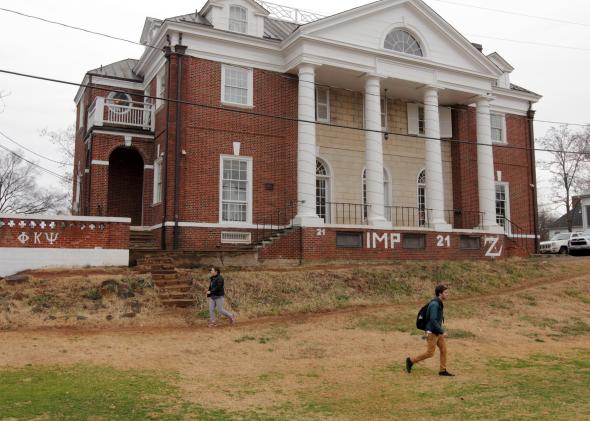The Washington Post Inches Closer to Calling the UVA Gang Rape Story a Fabrication

Photo by Jay Paul/Getty Images
The Washington Post has an update on Rolling Stone's UVA story that strongly implies, without outright saying so, that the gang rape at the center of Sabrina Rubin Erdely’s article might be fabricated. Post reporter T. Rees Shapiro spoke at length with the three friends who met up with Jackie, the student who says she was raped, on the night in question. In the Rolling Stone story this scene was crucial. Erdely described Jackie as standing mute in her bloody dress, the Phi Kappa Psi house where the alleged rape happened looming in the background, as her friends callously debated whether they should take her to the hospital and risk ruining their social reputations. This set up the larger theme of a university culture and social scene indifferent even to the most brutalized victims of rape.
Earlier, those friends told the Post that Jackie told them she’d been forced to have oral sex—a much different story than what Jackie told Rolling Stone. This new Post article adds some details that make the entire account seem more suspicious. Jackie had told her friends—referred to by the pseudonyms “Cindy,” “Andy,” and “Randall” in the original story and in the Post’s follow-ups—that she had a date on Sept. 28, 2012, with a handsome junior in her chemistry class. (In the version she told to Rolling Stone, that date was with someone she'd met at her lifeguarding job.) But in the Post story, the friends imply that this junior might not exist and may have been invented by Jackie to make Randall jealous.
When the friends first heard about this junior, they were intrigued and asked Jackie for his number. They started exchanging text messages with him, and he described Jackie as a “super smart hot” freshman. He complained, though, that she liked a “nerd 1st yr”— meaning Randall—who is “smart and funny and worth it.” Jackie’s friends could never find this junior in the UVA database nor on social media. She provided her friends with a picture of him, but the Post has since learned that the guy in the picture is a high school classmate of Jackie’s who does not go to the University of Virginia and was in another state participating in an athletic tournament on the night of the alleged rape. (More recently, Jackie gave her friends the name of a different guy. The Post also contacted him, and he said he’d never met Jackie.)
The Post story doesn’t connect all the dots, but it’s not hard to do. Jackie has now given her friends two different names for the man she was with that night. Neither of them was in fact with her, ever dated her, or even knew her all that well. She appears to have invented a suitor, complete with fake text messages and a fake photo, which suggests a capacity for somewhat elaborate deception. Jackie, though, has not recanted her story. Her attorney would not answer questions for the Post's story on Wednesday and has told reporters to stop contacting Jackie.
Here's the most disturbing journalistic detail to emerge from the Post's reporting: In the Rolling Stone story, Erdely says that she contacted Randall, but he declined to be interviewed, “citing his loyalty to his own frat.” Randall told the Post he was never contacted by Erdely and would have been happy to be interviewed.
That could mean one of two things: Jackie could have given Erdely fake contact information for Randall and then posed as Randall herself, sending the reporter that email in which he supposedly declined to participate in the story. Erdely also could have lied about trying to contact Randall. Rolling Stone might have hinted at this possibility in its “Note to Our Readers” when it referred to a “friend of Jackie’s (who we were told would not speak to Rolling Stone)" but later spoke to the Washington Post. That would take Erdely a big step beyond just being gullible and failing to check her facts, moving this piece in the direction of active wrongdoing.
When Erdely came on the DoubleX Gabfest two weeks ago to talk about her story, the first question we asked was how she settled on UVA.
Erdely said she called several universities but kept hearing typical stories about sexual violence. Then she called some activists and heard this sensational story about Jackie and gang rape. Maybe the lesson there is, if one story sounds so outlandishly different than the dozens of others you've heard, you shouldn't decide to make it the centerpiece of your reporting. You should wonder why.
When confronted with what appear to be so many orchestrated lies, it's getting harder to see Jackie as a person whose memory may have been shaken by trauma. But there is still some chance of that. Everyone, including Randall and Jackie’s suitemates, says that she seemed utterly traumatized and continued to be throughout the semester, so much so that she had to go home early before finals.
“She had very clearly just experienced a horrific trauma,” Randall told the Post. “I had never seen anybody acting like she was on that night before and I really hope I never have to again. ... If she was acting on the night of Sept. 28, 2012, then she deserves an Oscar.”

